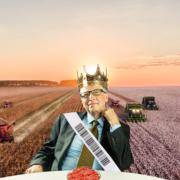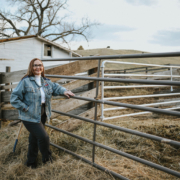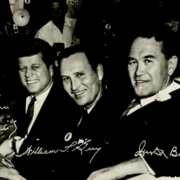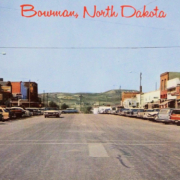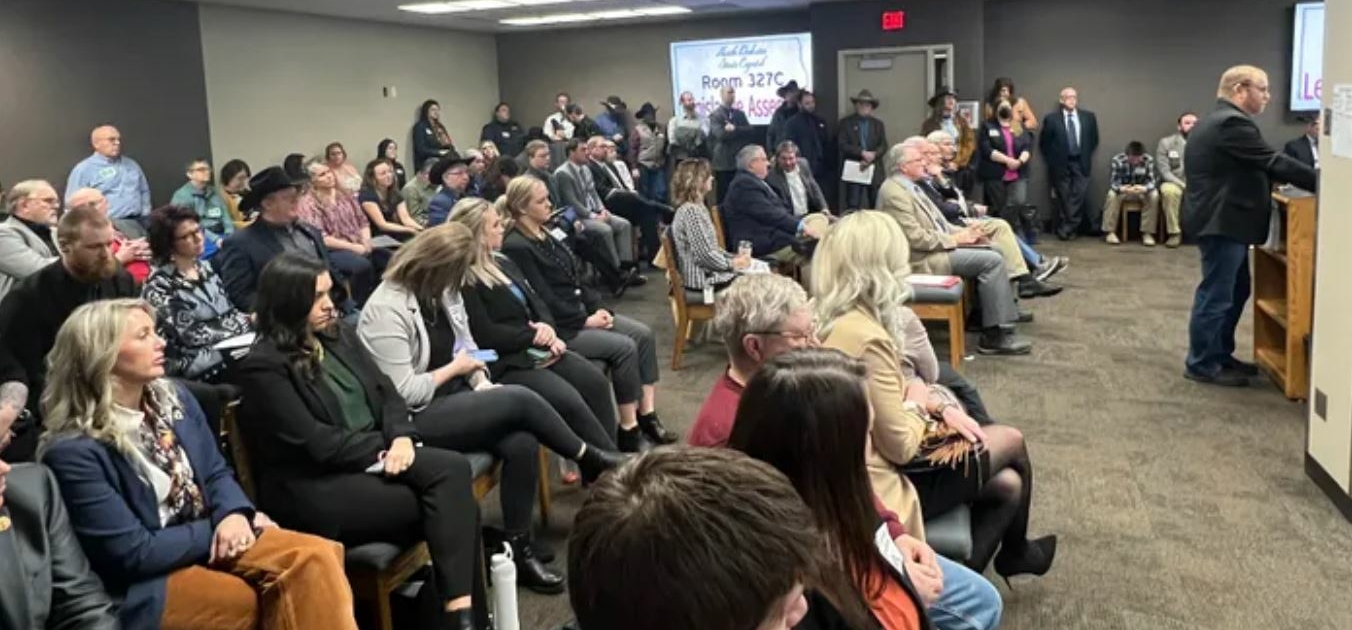
HB 1371 testimony, image courtesy of North Dakota Farmers Union
When I last submitted comments on North Dakota’s proposed legislation HB 1371, the “Trojan Horse Bill” that would allow an open door to corporate farming, I was adamant that it had to be defeated. Still, I wasn’t optimistic. Given the current situation in North Dakota politics, I thought HB 1371 — wretched as it was — would be passed as proposed by the House, then passed by the Senate, and then signed into law by HB 1371’s chief cheerleader, Governor Doug Burgum. Nonetheless, I hoped this very dangerous bill would thereafter be referred to the citizens of North Dakota where it would be defeated.
I also hoped that after the referral, the legislature would undertake a serious review of our law and how it could be improved, but not weakened. A study is especially appropriate because “cheerleaders” for the bill used comparisons to other states’ laws and livestock numbers that were facile and superficial. Our farmers deserve deep study and accurate information before the legislature approves a hastily drafted bill promoted by Governor Burgum and his allies.
I wasn’t hanging around the hallways and coffee shop and hearing rooms of the legislature, but – obviously — people didn’t stop talking when the hearing closed. And, I was surprised to see that a much different version of HB 1371 emerged from the committee. This new version was adopted by a vote of 70 to 24, without further hearings on the new language. It’s a complicated bill and I won’t try to summarize it, but the text of the amended bill is here.
There is an old saying, incorrectly linked to Otto Von Bismarck: “Laws are like sausages. It is best not to see them made.” Like many bills that wind through the legislative gauntlet, the amended version of HB 1371 is a compromise. However, thanks to a public statement by North Dakota Farmers Union, we have some insight. In summary, the North Dakota Farmers Union leadership stepped in to negotiate a number of amendments. I’m guessing that, if these amendments “stick”, NDFU might not refer the bill to an up or down vote of the people, and to ensure a good result, NDFU has kept its options open. NDFU is officially “neutral” on the bill as amended. Being “neutral” is quite a shift, since they were very much opposed to the original version.
This conversation between Mark Watne, President of the North Dakota Farmers Union and Joel Heitkamp on the Joel Heitkamp radio show gives further insight. Mark and Joel both know how North Dakota legislative “sausage” is made. Listening to their conversation helped me understand the complex array of considerations behind the amendments. I defer to the NDFU leaders on the best way to defeat HB 1371 in its original form, and I’ll submit testimony when the time comes. My suggestions will propose that amendments be drafted to:
- Ensure that the Secretary of State and the Attorney General have the staff and budget to enforce the law against anyone (big or small) who might want to evade the complexities of the compromises in amended HB 1371. These elected officials are now required to enforce the anti-corporate farming law but their efforts are weak, ineffective and almost non-existent. It is incumbent on the legislature to ensure that the Attorney General and Secretary of State have the resources to audit, respond to complaints, and investigate and prosecute violations of the anti-corporate farming law.
- Update the reporting system for the officials who are this law’s “boots on the ground”: the county Registers of Deeds. They will see the new land deeds when the deeds are filed. But, this isn’t the old days when there were simple categories like “corporations” and “partnerships” and “individuals”. Today, there are multitudes of business formats, many with strings of initials, that have been created since the 1932 passage of the anti-corporate farming law as an initiated measure. If a purchaser of farmland isn’t an individual, why not have the Register of Deeds scan the deed and send it to the Attorney General’s office? The burden of detecting scofflaws shouldn’t be on county officials, who have plenty on their plates already.
- Follow Minnesota’s lead and limit trusts to nonprofit family farm trusts. I mean the kind of trusts that help manage the assets of elderly or infirm people, or of minors, or trusts that are used to help a family farm’s transition from one generation to another. Minnesota keeps detailed lists of all such trusts, and I doubt that we would disagree with how they allow family farm trusts to operate. (Check out the Minnesota AG’s website.) However, in North Dakota, a Bill Gates corporate officer can slap the name “trust” on a multimillion dollar mega-farm and give a corporate officer’s name as the “trustee” and, by that simple expedient, evade North Dakota’s laws. I hope the North Dakota legislature will wake up to this nasty loophole hiding in plain sight. Wealthy people and corporations (with or without involvement of US citizens) are going to use that “trust” language again and again, to buy vast swaths of North Dakota farm and ranch land. Every time the stock market drops (as it has been doing), money managers look for countercyclical investments for their clients. North Dakota is now a perfect target of that opportunistic greed.
- Improve the private right of enforcement provisions of our anti-corporate farming law, as a check and a balance against situations where the Attorney General fails to enforce the law. The Century Code already provides two avenues to enforce the anti-corporate farm law. The first is enforcement by the Attorney General (whose staff salaries are paid by us, the taxpayers) and the second is enforcement by a resident of the same county where the farm operation that is being challenged is located. If the private challenger wins, the defendant must pay the challenger’s attorneys fees and that is good. But, as far as I know, the private right of action is a dead letter. Why? Because if a challenger loses a case, the law says they must pay the defendant’s attorney’s fees and costs. See, NDCC Section 10-06.1- 25. (“If judgment is rendered for the defendant, such costs and a reasonable attorney’s fee must be paid by the plaintiff.” (Emphasis added.))Let me give an example of how this could work. I think that Bill Gates’ purchase of the Campbell Brothers Potato Farm in the name of the Red River Trust with a corporate officer as the trustee is illegal (for reasons I’ve explained many times so I won’t repeat them). I’ve urged the Attorney General to dig into the trust and to do a proper investigation. He hasn’t. However, I would never advise a client of mine to sue the Red River Trust. Even a small risk of losing to Bill Gates and having to pay his expensive lawyers would be too much of a risk for a regular (non-billionaire) person, even if they had strong reason to sue and had acted in complete good faith. This harsh result is a sanction. It is unfair when a citizen steps up in good faith to enforce a law in the public interest. People who act in good faith to support the public policy of this state should be encouraged, not penalized. For example, North Dakota’s Environmental Enforcement Act, Chapter 32-40, provides for a citizen’s right to sue but says costs of the defendant can be shifted to the plaintiff only if the case is found to be “frivolous.” Also, in disputes amongst owners of corporations, costs can be imposed on the losing party only if they have “acted arbitrarily, vexatiously, or otherwise not in good faith.” See NDCC 10-19.1-115(7).If Section 10-06.1-25 said, “If judgment is rendered for the defendant, the plaintiff shall pay fees and costs only if the court finds the plaintiff acted arbitrarily, vexatiously, or otherwise not in good faith,” I would feel much better about family farm agriculture’s ability to fight against an onslaught of corporations and corporate lawyers who believe they can break the anti-corporate farm law with impunity because there is no enforcement by the Attorney General and private parties are deterred by fear that they might lose and have to pay attorneys fees of the corporation as well as their own.
The fate of HB 1371, as amended by the House, will bear sharp watching while it is in the Senate. It may be that the negotiated amendments that made the law somewhat palatable to the North Dakota Farmers Union will not survive in the Senate. After all, the prime sponsors of the original version of HB 1371 include Senate Majority Leader David Hogue, Senate Agriculture Committee Chairman Larry Luick, and Senator Terry Wanzek, Chairman of the Senate Appropriations — Government Operations Division.
We are left with many questions, including:
- Will the Senate accept the House amendments that attempt to ameliorate the potential harm of the original HB 1371?
- Will the legislature have the gumption to tweak the budgets of the Secretary of State and Attorney General to provide money for investigation and enforcement?
- Will the legislature eliminate the sanction of mandatory payment of the defendant’s costs and attorney’s fees, if a citizen in good faith challenges a corporate acquisition, but is unsuccessful?
We’ll have to watch it closely and testify when we get the chance. Stay tuned.

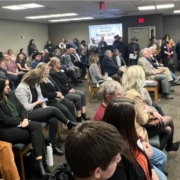
 KVLY
KVLY